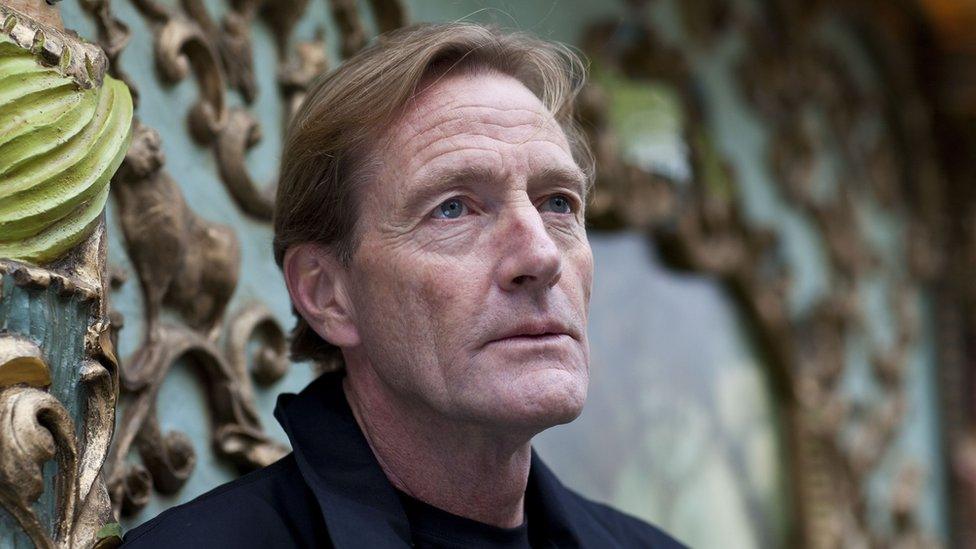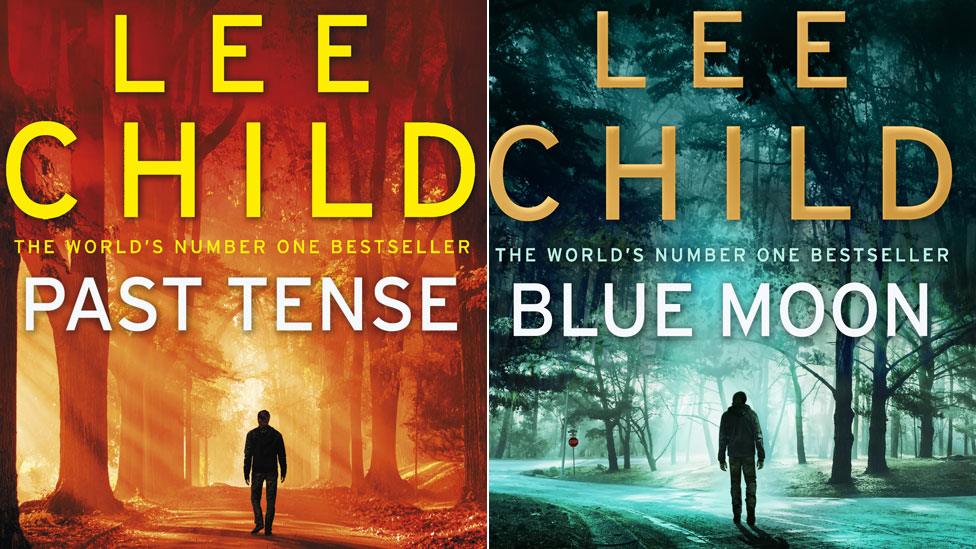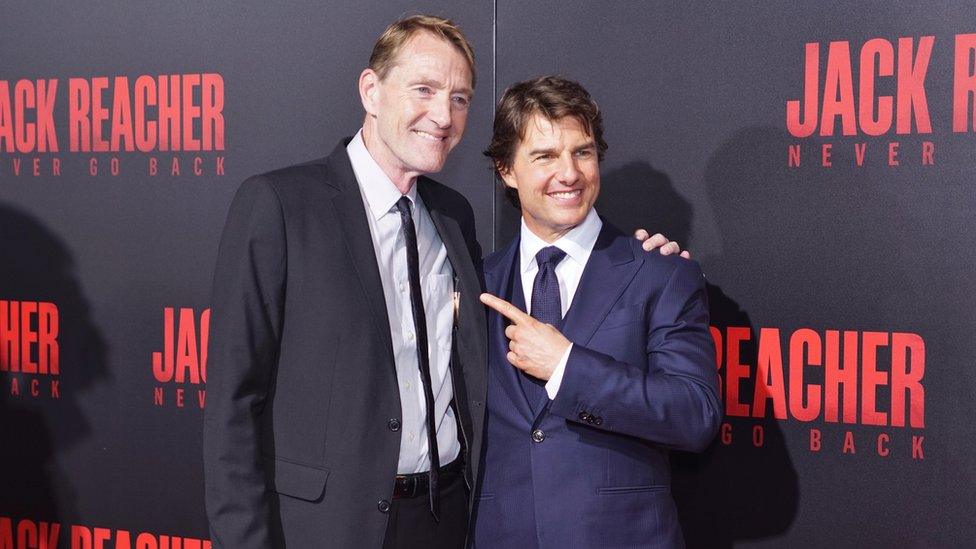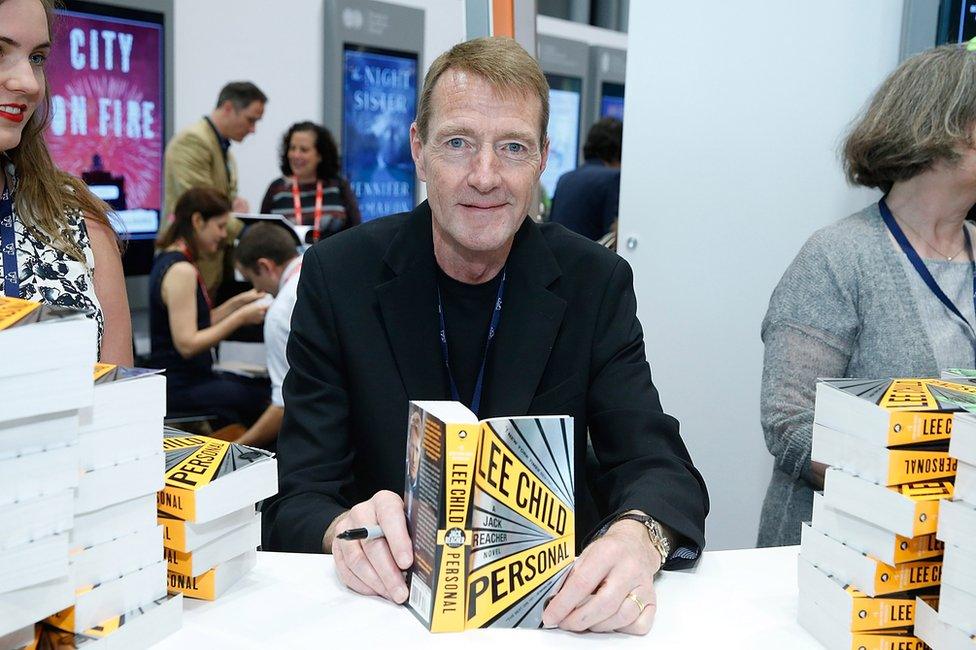How author Lee Child lost his job and found global success
- Published

Lee Child has had the kind of success most authors can only fantasise about. He's written 23 thrillers featuring American hero Jack Reacher - with total sales of at least 100 million copies worldwide. He's just been named author of the year at the British Book Awards. And if he hadn't lost his job in TV none of it would have happened.
Lee Child - born Jim Grant in Coventry in 1954 - says he grew up reading exactly what an average British boy would read in the 1960s.
"I'm not one of these guys who claim they read Dostoevsky when they were seven. I started with Enid Blyton and then the Biggles books by Captain W.E. Johns and later it was Ian Fleming. Alistair MacLean probably made the biggest impression on me with stories like Where Eagles Dare. All very normal stuff for a kid of my generation.
"Back then everything was so unstructured compared to the modern world of online book groups and suggestions for further reading. I sort of miss the chaotic days of random discovery."
When he was four the family moved to Birmingham. After university in Sheffield Jim Grant worked at Granada TV in Manchester, making countless trails and writing presentation links. "Most media people have lived and worked in London but I never did."
But as he neared 40 his job at Granada disappeared. He needed an income fast. Necessity proved the making of Lee Child, literally.

Past Tense is the latest Jack Reacher novel and Blue Moon will be the next
"I had never tried to write anything of length," he says. "Often at Granada I was writing scripts of three or four words. I completely admire people who combine writing with a day job because that would have been very hard for me. The first Jack Reacher story (Killing Floor) was written in Kirby Lonsdale in Cumbria which is as far away from America as you can imagine."
That first attempt began on 1 September and even now he always starts his annual round of writing on the same date.
Jack Reacher is 6'5" tall and a man without ties: he wanders America as a sort of freelance righter of wrongs, bringing justice to a world where it's in short supply. Reacher's a former military policeman but has no permanent occupation. "In some ways he shouldn't appeal: he's a rough tough guy and he can be brutal. But there was always a sort of organic honesty about him which people liked."
Reacher's adventures quickly found an audience. Child's evident mastery of what readers want has since bought him homes on Central Park West in Manhattan and in Wyoming.

There have been two Jack Reacher films starring Tom Cruise
Even pre-Reacher did he always love the US and know he might one day live there?
"The first time I went to America was 1974, 20 years before I started writing. I think what appealed was its size. You couldn't have a Jack Reacher who came from Surrey. I needed the vast, vast landscapes and the sense of lost, secret towns which no one has visited for years. It wouldn't work if Reacher came from Guildford.
"Often people really only know the two coasts of America. But the interior truly fascinated me. Just occasionally an American will say why is this Brit trying to tell us about our country? Usually I find I've been to far more states than they have and I've listened more."
But Child is also wary of too detailed research into the world he writes about. "You need to throw away 90%. The last story (Past Tense) was set in New Hampshire but I didn't research by going there: often it's more a memory of a place you visited years ago." The next Reacher book, Blue Moon, is set in an amalgam of two cities in south-east USA but he won't say which.
"I have a sympathy for the places that are disregarded or left behind or forgotten. In America often that came about when the interstate highways were built in the 1950s and hundreds and hundreds of towns were just bypassed. They either dried up and blew away completely or sometimes they survive but just as a shell of their former selves. That can be where you find the fascinating stuff."
He's not a political analyst but does he ever consider that the places Jack Reacher mainly visits tend now to make up the Trump-voting heartland?

"People want order restored and they can't get it in the real world but they can get it in the fictional realm," says Lee Child
"I do sometimes comment on politics obliquely. Reacher's a tough character who will have an organic appeal for the Trump voter. I use him to poke and prod them a little bit. People in the American interior can have a complex about being there.
"I've been travelling around America for 45 years and I've always loved it. I've come to the conclusion that the true split in America - socially, politically and in every way - is very basic. It's between areas of low population density and high population density.
"My adopted state of Wyoming is the size of the UK but it probably has the population of Leicester. The two versions of America are so radically different that it really does explain the divide you see now in politics."
Child says he wants to explain the attitudes of the people in the middle to the people on the US coasts. "But also the other way round because they never really see eye to eye. I've spoken to a lot of Americans and I listen wherever they are and whatever their politics. Almost always they're very generous people."
There were two Reacher films, in 2012 and 2016, starring Tom Cruise. No follow-ups are planned although there's talk of a possible TV series with a different lead actor, possibly taller.
The producers will need to dramatise on screen the scenes of harsh violence which form an essential part of the stories' success with readers.
"People live with this low-level buzz of frustration, especially when it comes to crime and justice. In most places if your car gets stolen the police will never catch the guys. So people want to turn to fiction where there's a beginning and a middle and an end and absolutely the bad guys will get caught and punished.
"People want order restored and they can't get it in the real world but they can get it in the fictional realm. It's a tremendous consolation and it's a big part of what Reacher does in the books."
Lee Child is so productive that talking to him it's hard not to stray into his next book and the one after that. Blue Moon will appear in October but by then he'll already be at work on Reacher 25.
"By August there should be an opening line in my mind or maybe even an opening paragraph. Then it's important to me to sit down on 1 September and start the actual writing: it gives a structure to my year which I think you need if you're self-employed.
"Sometimes the story develops quite slowly and by January 2020 probably I'll be getting worried that I'm drying up and not enough is written. So I put myself under more pressure and tell myself it needs to be done by March. Though usually it becomes April. But sitting here in May 2019 genuinely I haven't the faintest idea where Jack Reacher will be or what he'll be doing next time."
Though seeking justice for the disregarded or left behind or forgotten will surely be in there somewhere.

Follow us on Facebook, external, on Twitter @BBCNewsEnts, external, or on Instagram at bbcnewsents, external. If you have a story suggestion email entertainment.news@bbc.co.uk, external.